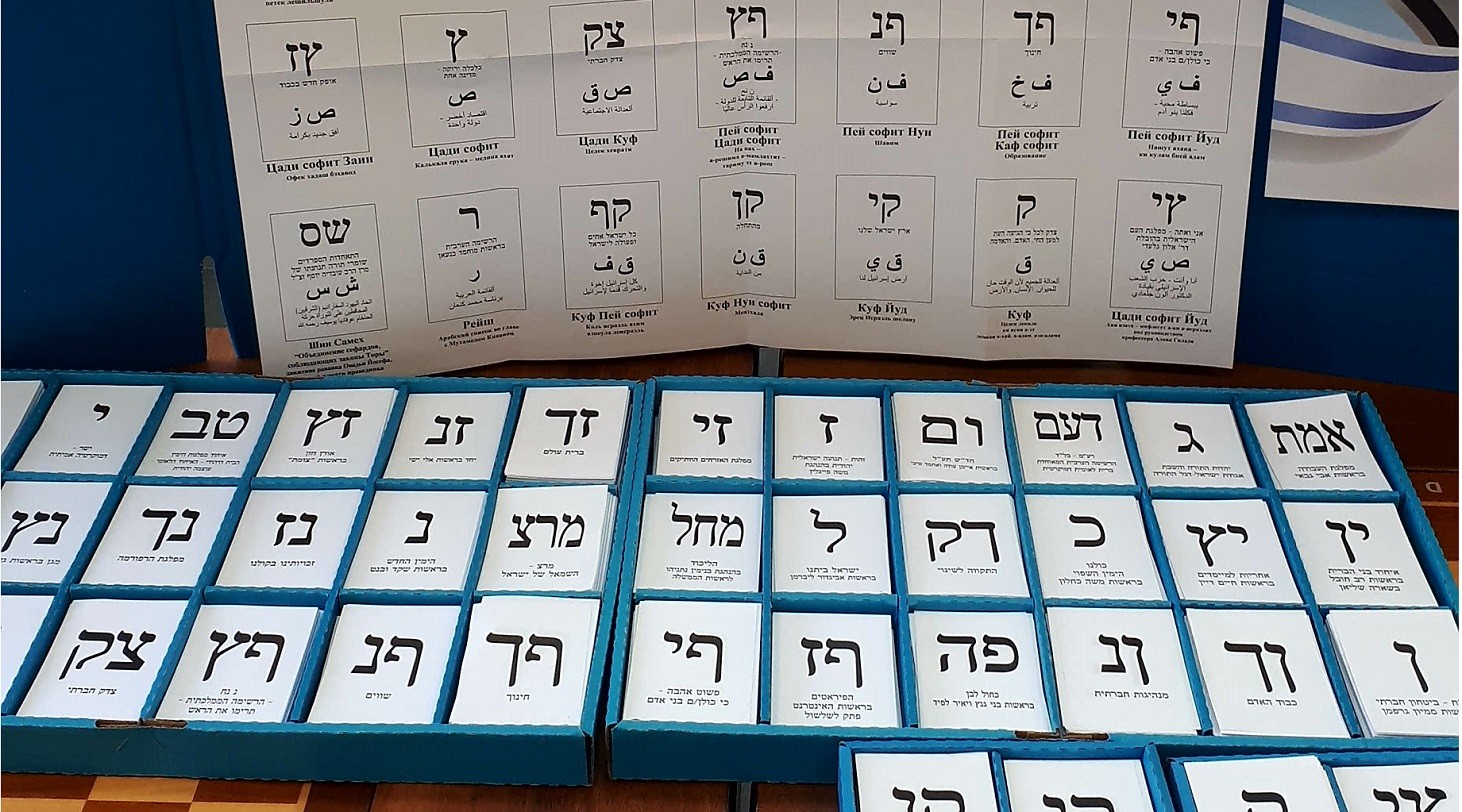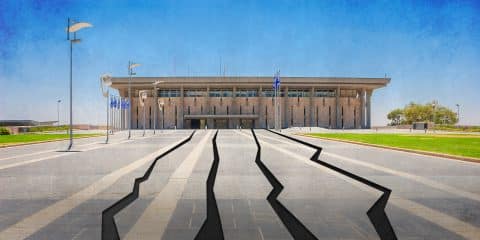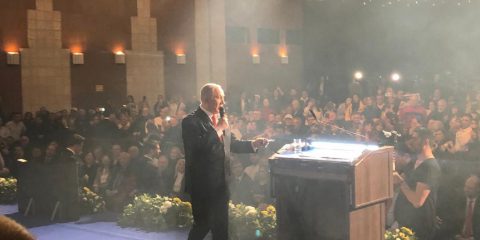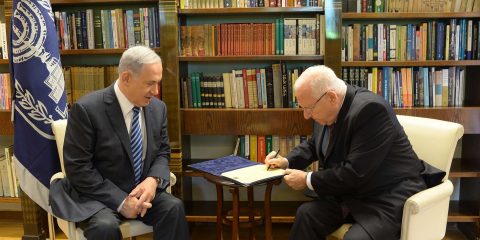מערכת הבחירות הייתה מכוערת, אך זו תהיה טעות לראות בישראל חברה משוסעת.
מסע הבחירות הצורם שעברנו היה רצוף בהאשמות אישיות מקוממות. הבחירות היו בעיקר משאל עם על עתידו הפוליטי של בנימין נתניהו. אישיותו ובעיותיו המשפטיות היו במוקד ההתקפות של אלו אשר לא רצו לראותו ממשיך כראש הממשלה, ולאו דווקא המדיניות שהנהיג.
למעשה, מעבר לשפה הבוטה שבה השתמשו שתי המפלגות העיקריות במסע הבחירות, אפשר להבחין בהסכמה רחבה על המהלכים הדיפלומטיים והביטחוניים של הממשלה היוצאת. הליכוד וגם מפלגת כחול-לבן התעלמו כמעט לחלוטין מהסוגיה הפלסטינית במהלך מסע הבחירות. כאשר רמטכ”לים לשעבר בכחול-לבן כן התייחסו לנושא הפלסטיני הקפידו להדגיש שאינם “שמאל”, ושאינם ממליצים על נסיגות חד-צדדיות.
מפלגת העבודה, שעדיין מזוהה בעיני רבים בארץ עם תהליך אוסלו אשר כשל, גם היא העדיפה להתחמק מלדון בנושא זה. רק מר”ץ, מפלגה בשוליים השמאליים של המפה הפוליטית בארץ, התלוננה על העדר דיון רציני בהשגת שלום עם הפלסטינים.
מעניין שלמרות הידיעה על ההודעה הקרובה של ממשל ארה”ב על תוכניתו של הנשיא טראמפ, “עסקת המאה” בין ישראל לפלסטינים, לא התעוררו דיונים בנושא. כמובן כמעט כל הבוחרים בישראל ידעו מעט מאוד על תוכנה של התוכנית האמריקנית, אבל כולם ידעו מה תהיה תגובתם של הפלסטינים – דחייה מכול וכול, כפי שקרה בכל הצעות השלום הקודמות.
אכן, לישראלים אין שום אשליות לגבי הפלסטינים. הם פחות או יותר מסכימים עם המדיניות של נתניהו שמגובה על ידי הממסד הביטחוני והמכונה “ניהול הסכסוך”. בהעדר שותף להשגת הסדר מדיני יציב, המדיניות היא לצמצם סבל משני הצדדים הניצים על ידי שימוש ב”מקל וגזר”, תוך הימנעות מצעדים הרפתקניים.
התקשורת הישראלית הדגישה את התסכול העמוק של תושבי עוטף עזה בגלל ההבלגה שגילה נתניהו כלפי חמאס – אבל מפלגתו זכתה בניצחון אלקטורלי גדול בכל הערים בעוטף עזה.
מנהיגי כחול-לבן לא הציעו מדיניות לטיפול בחמאס שתהיה שונה מדרכו של נתניהו. יש למעשה הסכמה רחבה שלמרות הפרובוקציות האלימות מעזה אין להתפתות לכבוש את רצועת עזה. פלישה לעזה ושליטה בה לאורך זמן עשויות לצמצם באופן משמעותי תקיפות טילים וטרור מסוג אחר, אך המחיר של מבצע כזה אינו כדאי. המפלגות שמימין לליכוד אשר דרשו בקולי קולות מבצע צבאי רחב היקף שמטרתו לכבוש את הרצועה ולהכריע את חמאס לא כל כך הצליחו אלקטורלית.
נראה שהציבור בישראל בסופו של דבר מעדיף את הגישה הזהירה שאפיינה את ממשלות נתניהו. מדיניות “כיסוח הדשא” קבעה לצה”ל מטרות מדיניות וצבאיות מוגבלות, והיא משקפת את ההנחה שישראל נמצאת בסכסוך ממושך ולא פתיר. בתנאים אלה השימוש בכוח מיועד בעיקרו לפגוע ביכולותיו של החמאס להזיק לישראל. השימוש במבצע צבאי רחב נועד להחזיר לישראל את כושר ההרתעה, ולהשיג שקט לאורך הגבולות לתקופות ארוכות יותר עד שהחמאס יחזור לסורו.
רוב גדול של הישראלים ראו בעין יפה את הצעדים הדיפלומטיים של ארה”ב במהלך מסע הבחירות: הכרה בריבונות ישראל ברמת הגולן, וצירוף משמרות המהפכה של איראן לרשימת ארגוני הטרור בארה”ב. בכחול-לבן הבינו שצעדים אלו נועדו גם לעזור לנתניהו בבחירות, אבל נמנעו מלבקר את הנשיא טראמפ בגלל ההסכמה הישראלית הרחבה לשמור את רמת הגולן, שיש לה חשיבות אסטרטגית, וגם משום שקיימת בישראל תפיסת איום גבוהה בנושא איראן.
הקרבה של נתניהו לטראמפ לא עוררה שום ביקורת ציבורית, אלא הערכה לראש הממשלה שהייתה לו החוכמה להפוך לחבר של נשיאה של המדינה החזקה בתבל. אין שום ספק בראשם של הישראלים שיחסים טובים עם ארה”ב הם עמוד תווך בביטחון ישראל. באופן כללי, ההצלחות הדיפלומטיות הגדולות של נתניהו בפיתוח יחסים עם רוסיה, הודו, ברזיל ובמזרח הים התיכון, כמו גם מעמדו בחלק מהעולם הערבי, היו נקודות זכות חשובות בשקלול הבוחרים בקלפי.
לכידות לאומית היא מרכיב חיוני ביכולת של ישראל לעמוד באתגרים הביטחוניים שלפנינו. למרבה המזל, תוצאות הבחירות מצביעות על הסכמה לאומית רחבה בנושאים של מלחמה ושלום. מערכת הבחירות הייתה מכוערת, אך זו תהיה טעות לראות בישראל חברה משוסעת.
סדרת הפרסומים “ניירות עמדה” מטעם המכון מתפרסמת הודות לנדיבותה של משפחת גרג רוסהנדלר.
תמונה: [TaBaZzzz [CC BY-SA 4.]










 - בניית אתרים
- בניית אתרים